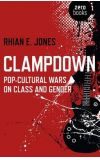
17 May 2013 02:27:58
The question has been regularly aired for half a decade now, and Rhian Jones sympathises with it. But in this thoughtful, short book, she argues essentially that our pop culture remains reflective of what's happening, but it has done a 180-degree flip, so that the dominant voices now mirror the values of the powerful. Good examples are the hugely successful Mumford & Sons, privately educated chancers whose banjos, beards and raggedy clothes embody a woeful kind of austerity chic, or the equally posh Noah and the Whale, products of the same affectedly folky milieu whose music sounds like a noncommittal shrug (the embodiment, perhaps, of all that "Keep Calm and Carry On" paraphernalia).
As far as musicians are concerned, little of this is a matter of conscious intent: it's down to the fact that they are usually lightning rods of one kind or another, and what they channel these days is a kind of post-ideological establishment-think, complete with the blank acceptance of the rightward march of politics. In certain cases, moreover, men with guitars harbour the same zeitgeisty snobbery evident in much modern comedy, fiction and journalism – which tends to place working-class women at the bottom of the heap, and has played its part in a hardening of public attitudes, particularly to the welfare state.
This is all heady, ambitious stuff, probably better suited to a full-length book. At first glance, much of what Jones writes is over-done, and in thrall to the strangulated cult-studs vernacular; it's too full of words such as "concordance" and "atavistic". But quickly, the intensity of her critique makes her book unputdownable. As proved by her prodigious blogging at a site called Velvet Coalmine, she draws on a range of reference points, from the Spice Girls to the left-leaning conservatism of "Blue Labour". And the fact that she sprinkles the text with references to those great pop-cultural intellectuals the Manic Street Preachers – like her, products of the South Wales valleys – says a lot about what she thinks pop music might still aspire to.
Stripped down, this is a cultural history that goes from the early 1990s to the present. Everything hangs on a passage in the opening pages: "A distinguishing mark of the 90s in Britain was a cultural shift from the nuanced and pluralistic articulation of identities to their appearance in a simulated or appropriated form, as stereotypes." Class, Jones says, was depoliticised at speed, and rendered camp. Meanwhile, she writes, "those who happened to be born with the same signifiers involuntarily bolted on" – that is, your actual working class – "were vanishing from public view, their place on the political and cultural stage taken by ersatz, commodified versions of themselves, in a process so seamless as to be sinister."
Quite so. The watershed in her story is the moment embodied by so-called Britpop, and lad culture, both of which encouraged a kind of class tourism, whereby many a young bourgeois could fake an interest in such totems of supposed proletarian authenticity as football, dog racing and greasy spoon cafés, all of which defined the tenor of British pop circa 1994-5 (witness Blur's breakthrough album Parklife). As Jones sees it, the way was thus opened for a horror show that arrived just under a decade later, when two former private schoolboys came up with the cheap and nasty cast of the hugely successful sketch show Little Britain, not least Matt Lucas's Vicky Pollard, every right-wing trope about working-class women brought to life. Jones juxtaposes her with the infamous 1992 speech by the-then Tory minister Peter Lilley, who took aim at a "little list" of "benefit offenders" including "young ladies who get pregnant just to jump the housing list".
Her point is that cultural expression can carry much political weight: as it turned out, the Little Britain worldview dovetailed conveniently with the programme of the current government. Or, as she puts it: "Labelling, shaming and ridiculing the working class through the use of signifiers and stereotypes in popular culture is a means of making the political, social and economic clampdown occasioned by austerity appear less harsh than it is."
She is right, too, that there was another 1990s, embodied in politicised writing in the music press, and no end of non-rock music (how distant we now are from a world that spawned the London-based band Stereolab's "overtly communist indietronica"). She also writes about the punk-feminist subculture known as riot grrrl, one last go at giving rock a bold female refit, before what followed pushed women to the margins. Among the casualties were Kenickie, a three-quarters female band from the post-industrial north-east, fronted by the future TV and radio presenter Lauren Laverne. "Their music," Jones points out, "offered a presentation of provincial female life crafted with sympathy and solidarity, and an insistence on their social and sexual agency." It really did, and we have heard nothing like it since.
Instead, a whole expanse of pop culture remains fond of the enduring idea of the "chav", and often characterises working-class life as, to quote from the book, a "threatening and marginalised carnival of horrors, rendered almost alien". This applies to women in particular, as evidenced by the Kaiser Chiefs' once-inescapable hit "I Predict A Riot". "Girls scrabble round with no clothes on / To borrow a pound for a condom / If it wasn't for chip fat they'd be frozen" – this is much the same view of the female herd as emerges from the pages of the Daily Mail, and another example of the kind of drab and reactionary stuff that compelled Jones to work on this fierce and valuable book.

